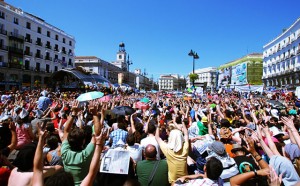Choosing a “person of the year” is rarely easy and when Iberosphere co-editor Andrew Eatwell and I set about deciding on the Iberians of 2011, the difficulties were all too clear. So many events unfold over the course of 12 months: political, economic, cultural, sporting and otherwise. Is a football player more worthy of attention than a politician? Is a writer more important than a banker? Obviously, that depends on what each achieved and how much importance you attach to football, politics, literature and banking. For us, each can be of huge significance to a nation’s state of mind, if not its everyday life.
But there is a more general issue. What is it that we are gauging? From the start we decided we were not necessarily saying we approved of those featured. These are not the “best” Spaniards and Portuguese of the year. The Iberians of 2011 are individuals and movements that had the greatest impact on Spanish and Portuguese society, for better or for worse.

After much consideration, Andrew and I felt that the indignados protest movement was clearly the outstanding candidate. It may have many critics, but even those cannot deny that 15-M, as it is often known, has made waves this year, reflecting the everyday concerns of millions of Spaniards.
Then there were the runners-up. Selecting a politician is always going to provoke controversy. As an outgoing prime minister, José Luis Rodríguez Zapatero would be an empty choice, despite the economic measures he has overseen in recent months.
We also felt strongly that although Mariano Rajoy may have seemed an obvious candidate, when looked at a little closer, he didn’t meet the requirements. Spain’s prime minister-elect will almost certainly be a major figure in 2012, but even his supporters will admit it was his Popular Party (PP) (and the Socialist government) that won him the general election, not its candidate.
This generation of Spanish politicians has few outstanding figures. However, PP number two María Dolores de Cospedal seemed, in many ways, more apt. She is also one of the few women to feature at the very forefront of Spanish public life.
The case for Portuguese Prime Minister Pedro Passos Coelho’s inclusion seemed stronger than that of Rajoy, having taken the helm of a country already requiring an EU bailout and yet somehow maintaining popular support.
Meanwhile, the radical Basque nationalists on the shortlist may be particularly provocative for many Spaniards, but this year has been a monumental one for them, in more ways than one.
Elsewhere, figures such as footballer Cristiano Ronaldo and novelist Javier Marías are admired by their fans and despised by their many critics. But they make any year a lot more interesting. And nobody can say 2011 hasn’t been interesting.
Read the full story on the Iberians of 2011, the indignados and the runners up.
Leave a Reply
You must be logged in to post a comment.